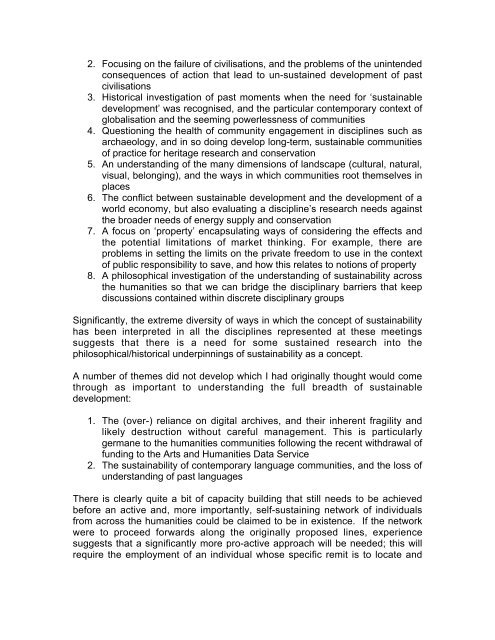Project Briefing A Higher Education Academy ESD Resource
Project Briefing A Higher Education Academy ESD Resource
Project Briefing A Higher Education Academy ESD Resource
You also want an ePaper? Increase the reach of your titles
YUMPU automatically turns print PDFs into web optimized ePapers that Google loves.
2. Focusing on the failure of civilisations, and the problems of the unintended<br />
consequences of action that lead to un-sustained development of past<br />
civilisations<br />
3. Historical investigation of past moments when the need for ‘sustainable<br />
development’ was recognised, and the particular contemporary context of<br />
globalisation and the seeming powerlessness of communities<br />
4. Questioning the health of community engagement in disciplines such as<br />
archaeology, and in so doing develop long-term, sustainable communities<br />
of practice for heritage research and conservation<br />
5. An understanding of the many dimensions of landscape (cultural, natural,<br />
visual, belonging), and the ways in which communities root themselves in<br />
places<br />
6. The conflict between sustainable development and the development of a<br />
world economy, but also evaluating a discipline’s research needs against<br />
the broader needs of energy supply and conservation<br />
7. A focus on ‘property’ encapsulating ways of considering the effects and<br />
the potential limitations of market thinking. For example, there are<br />
problems in setting the limits on the private freedom to use in the context<br />
of public responsibility to save, and how this relates to notions of property<br />
8. A philosophical investigation of the understanding of sustainability across<br />
the humanities so that we can bridge the disciplinary barriers that keep<br />
discussions contained within discrete disciplinary groups<br />
Significantly, the extreme diversity of ways in which the concept of sustainability<br />
has been interpreted in all the disciplines represented at these meetings<br />
suggests that there is a need for some sustained research into the<br />
philosophical/historical underpinnings of sustainability as a concept.<br />
A number of themes did not develop which I had originally thought would come<br />
through as important to understanding the full breadth of sustainable<br />
development:<br />
1. The (over-) reliance on digital archives, and their inherent fragility and<br />
likely destruction without careful management. This is particularly<br />
germane to the humanities communities following the recent withdrawal of<br />
funding to the Arts and Humanities Data Service<br />
2. The sustainability of contemporary language communities, and the loss of<br />
understanding of past languages<br />
There is clearly quite a bit of capacity building that still needs to be achieved<br />
before an active and, more importantly, self-sustaining network of individuals<br />
from across the humanities could be claimed to be in existence. If the network<br />
were to proceed forwards along the originally proposed lines, experience<br />
suggests that a significantly more pro-active approach will be needed; this will<br />
require the employment of an individual whose specific remit is to locate and
















